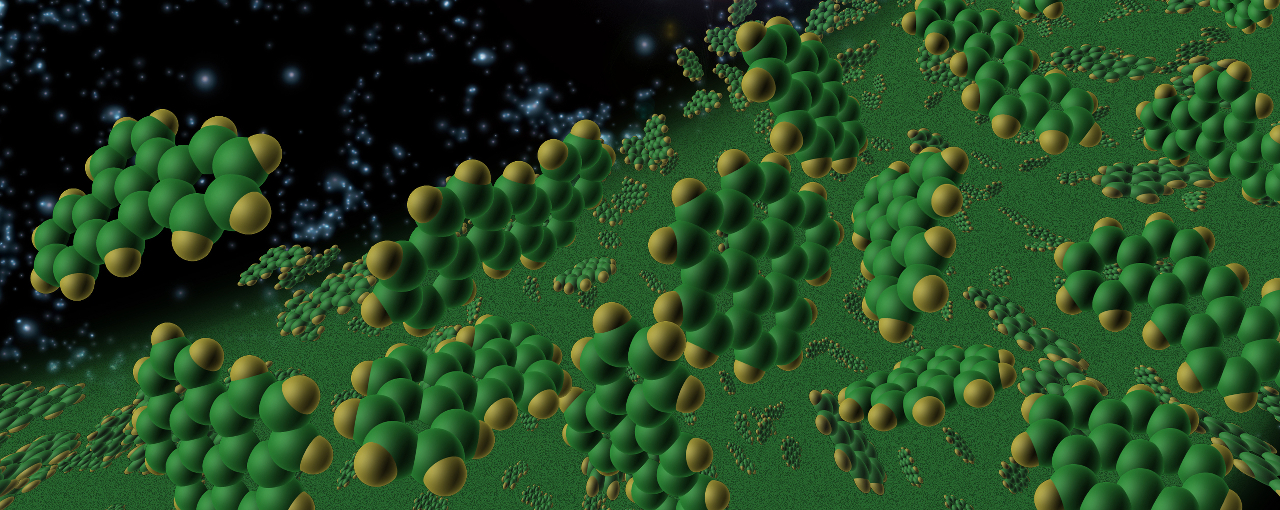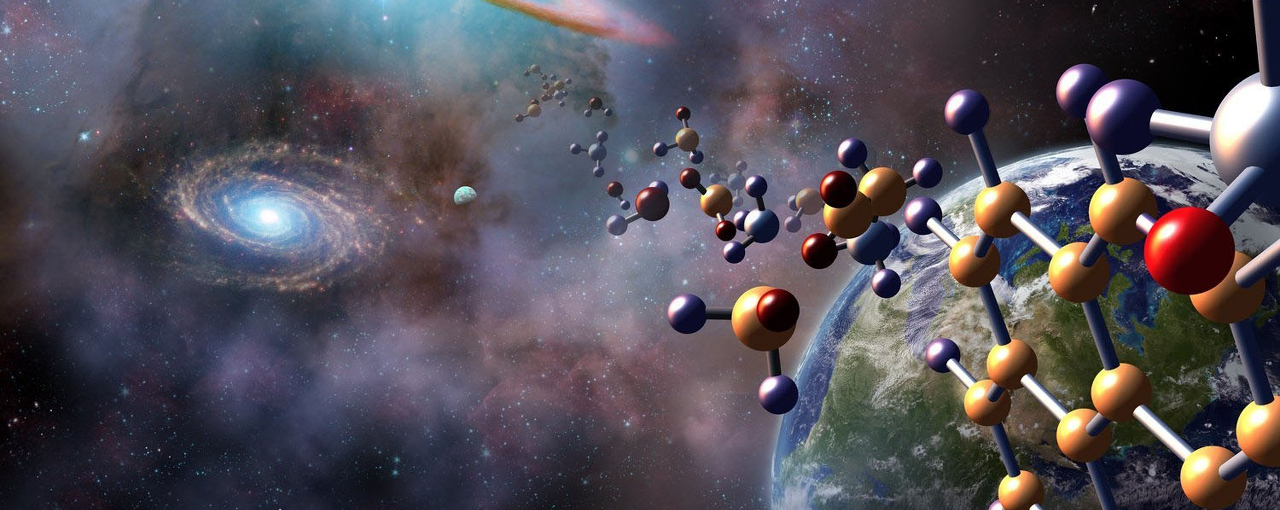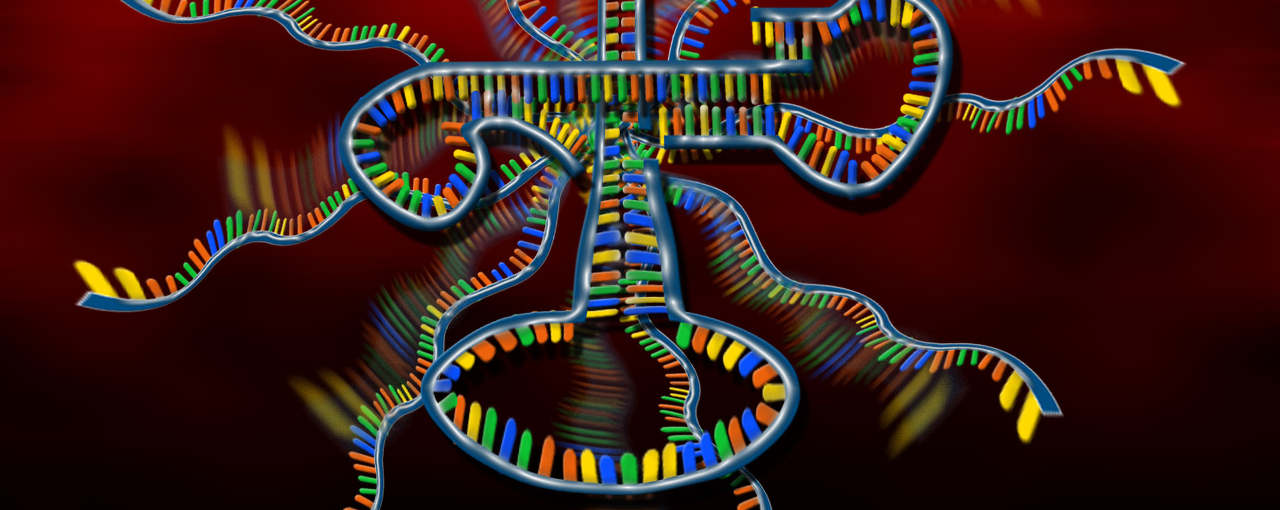-
Joint NASA-NSF Ideas Lab on the Origins of Life
June 07, 2016 / Written by: Julie Fletcher
This artist's conception symbolically represents complex organic molecules, known as polycyclic aromatic hydrocarbons, seen in the early universe. These large molecules, comprised of carbon and hydrogen, are among the building blocks of life.
The molecules shown, called quinones, are potentially significant for the “origin of life” or the habitability of planets.
Artist's rendering of a Ribonucleic Acid (RNA) molecule.
The Astrobiology Program of NASA’s Science Mission Directorate (SMD) is joining with the Directorate for Biological Sciences (BIO) and the Directorate of Geosciences (GEO) of the National Science Foundation to sponsor an “Ideas Lab” activity on the Origins of Life.
Scientific Background
Most theories of the origin and early evolution of life focus on one of two different models. “Metabolism first” approaches generally focus on non-biological sources for the reactions of metabolism and rarely discuss in detail how bio-polymers (proteins or poly-nucleotides) arose to catalyze them. “RNA World” models assume that metabolic ribozymes existed but never describe how or why proteins took over this role — there are no naturally occurring modern ribozymes that participate directly in metabolic reactions.
Studies of the origin of life are therefore confronted with a giant chasm between the reactions of small molecules that can generate nucleic or amino acids and, possibly, polymerize them, and a fully developed system that satisfies the working definition of “life.”
The ultimate aim of this Ideas Lab is to facilitate the generation and execution of innovative research projects aimed at identifying and funding potentially transformative research to address the origin and early evolution of the modern, two-polymer life system. Understanding plausible pathways for the origin of life will contribute directly to our understanding of the indispensable properties of life on Earth and inform our search for life on other worlds.
The Ideas Lab Concept
An Ideas Lab is an intensive, interactive and free-thinking workshop on a particular topic, involving up to thirty diverse participants. It aims to stimulate thinking in promising new research approaches and theories aimed at understanding the origin of life. Participants will be expected to engage constructively in dialogue with each other, the facilitators, and the Director and Mentors to develop collaborative research proposals. Collaboration will be encouraged, especially by bringing diverse minds together to embrace this challenge.
An Ideas Lab will run over five days starting mid-morning on day one and finishing mid-afternoon on day five. The approach of the Ideas Lab is not to discuss ideas that are already well developed but not yet published. Rather, the goal is to bring individuals from different disciplines together to interact and engage in free-thinking on first principles, to learn from one another and create an integrated vision for future research projects. It is expected that the sharing of these ideas would be encouraged within the Ideas Lab but their confidentiality would be respected outside the Ideas Lab.
The Ideas Lab will be led by a Director whose role will be to assist in defining the topics and aid facilitated discussions at the event. The Director will be joined by a small number of Mentors. The Mentors have been selected by the NSF and NASA, based on their intellectual standing, their impartiality and objectivity, and their broad understanding of, and enthusiasm for, the subject area. The Director and Mentors will fully participate in the Ideas Lab, but will not be eligible to receive research funding under this collaborative activity. They will act as impartial “real time” peer reviewers throughout the Ideas Lab. process, providing a function analogous to that of a peer review panel.
Following the Ideas Lab, full proposals will be invited for submission by either NSF or NASA. NASA and the NSF anticipate making five to ten awards in FY 2017 pending availability of funds and the type, scale, and variety of project ideas developed at the Ideas Lab. Up to $8,000,000 will be available for US researchers in FY 2017 for successful proposals through the Ideas Lab, pending availability of funds and compelling proposals.
Submission Guidance
Individuals interested in participating in the Ideas Lab should respond to NSF solicitation “Origin of Life Program Solicitation” 16-570 by submitting applications to participate in the workshop as preliminary proposals through NSF’s FastLane system (see http://tinyurl.com/OoLideasLab2016). Participation in the Ideas Lab is by invitation only from the pool of applicants who submit preliminary proposals. Participants will be selected on the basis of the interests, expertise, and other characteristics described in their submitted preliminary proposals. All participants should be willing to engage in frank disclosure and assessment of ideas in a collegial and professional fashion. An independent selection committee will recommend a list of potential participants from all applicants. NSF and NASA Program Staff, in consultation with the Director and Mentors, will select the final list of participants from the submitted preliminary proposals.
Schedule
The time frame for the solicitation is planned to be:
Release of NSF call for proposals – June 7, 2016
Required Preliminary Proposals – August 5, 2016
Ideas Lab – September 18-23, 2016, Hyatt Regency Chesapeake Bay, Cambridge, MD
Invited proposals due – December 19, 2016
Selection – See NSF solicitation, but target is January 2017Questions may be addressed to Michael New, at michael.h.new@nasa.gov, or Mary Voytek at mary.voytek-1@nasa.gov.
- The NASA Astrobiology Institute Concludes Its 20-year Tenure
- Global Geomorphologic Map of Titan
- Molecular Cousins Discovered on Titan
- Interdisciplinary Consortia for Astrobiology Research (ICAR)
- The NASA Astrobiology Science Forum Talks Now on YouTube
- The NASA Astrobiology Science Forum: The Origin, Evolution, Distribution and Future of Astrobiology
- Alternative Earths
- Drilling for Rock-Powered Life
- Imagining a Living Universe
- Workshops Without Walls: Astrovirology